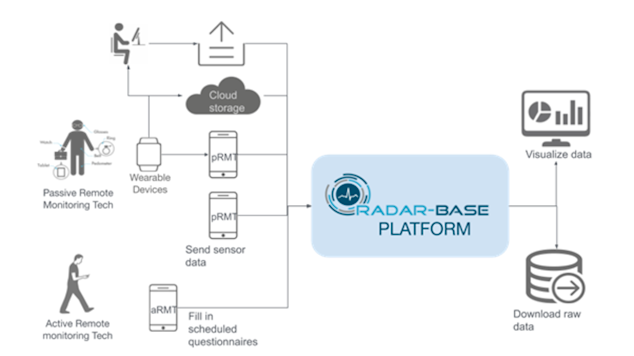RADAR-base: collecting data from wearables and mobile apps
A central theme in the field of digital health is the opportunity to continuously monitor patients in their daily life with sensors that measure a growing set of physiological and subjective signals and external information in smartphones, wearables and the Internet-of-Things.
If these data streams can be reliably collected, analysed, and acted on, we will gain a better understanding of disease aetiology, diagnosis, and prognosis in many disease areas. Ultimately these data may help patients and clinicians manage long term conditions better – potentially allowing earlier interventions if the data indicate someone’s state is deteriorating.
Scalable, real-time streaming platform
The National Institute for Health Research (NIHR) Maudsley Biomedical Research Centre developed the RADAR-base mHealth platform, a scalable, real-time streaming platform for digital health-related signals. It has secure data collection, storage and management. It can accept information from apps for ‘active’ remote monitoring, such as questionnaires, and passive monitoring, such as heart rate or GPS using sensors from smartphones and wearables (Fitbit, Garmin).
RADAR-base (Remote Assesment of Disease And Relapse) integrates with other apps (e.g., for cognitive screening) and has a portal for patient enrolment and clinical assessments. The software supports dashboards for clinicians and researchers to view data and integrate with third-party systems including health records. There are no equivalent freely available platforms, with RADAR-base winning the ‘Best of Show’ award at the Bio-IT World Conference 2018 for best innovative product in the life sciences industry.

Underpinning major national and international projects
The platform has an active and rapidly growing community across academia, industry, and device manufacturers with uses in mental and physical health across the lifespan. It underpins major EU programmes (more than £50m) including RADAR-CNS, RADAR-AD, BigData@Heart, AIMS-2-Trials and DynaMORE, and national projects including an NIHR Long-Covid study (£9.3m). The platform has enabled studies of underrepresented groups and features such as homestay and sociability have been shown to be associated with outcomes including depression.
Remote monitoring poses significant questions for participants, including privacy and data security concerns, which can be barriers to participation. Our co-produced qualitative research has informed study design to maximise acceptability.
The next steps for RADAR-base include developing real-time interventions, linking mobile health data with electronic health records and extending the use of the platform beyond research to clinical services.
IMPACT AREAS:
Developing Resources for Research | Involving Patients in Research | Industry Collaboration | Data and Analytics to Drive Healthcare | National and International Collaboration









